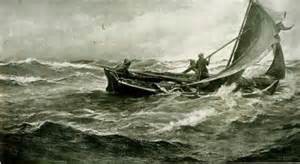Have you ever faced an impossible situation and longed for a way to overcome the trial? I’ll let you in on a secret. The secret to overcoming trials is not in trying harder.
My mother was an excellent role model for a good work ethic, dependability, and perseverance. When she made a mistake that interrupted progress, she’d mutter, “The hurrier I go, the behinder I get.” When in similar situations, I tend to repeat the
familiar phrase.
While reading Mark recently, I thought of that expression and wondered if I need to change the words to “The harder I row, the behinder I get.”
Mark 6 tells about Jesus teaching  thousands of people all day long, then asking the disciples to serve them bread and fish. Afterward, they collected bushels of leftovers. Jesus then told his disciples to row to the other side of the sea while He stayed to pray.
thousands of people all day long, then asking the disciples to serve them bread and fish. Afterward, they collected bushels of leftovers. Jesus then told his disciples to row to the other side of the sea while He stayed to pray.
After an exhausting day, the disciples got in a boat and began to row. Soon the winds picked up, waves battered them, and they weren’t able to make headway. Laboring at the oars with wind in their face, they were stranded in the middle of the sea. The harder they rowed, the behinder they got (Mark 6:45-47).
Jesus came down from the mountain, and “seeing them straining at the oars, . . ., He came to them, walking on the sea; and He intended to pass by them” (Mark 6:48).
Ahhh! Jesus is near. There’s nothing to fear.
Or is there?
Did you see the end of the end of the verse? “He intended to pass by them.” Why would Jesus choose to pass by his closest friends while they were having trouble obeying Him?
After praying for understanding, I remembered the days when our children were home. Sometimes they were more open to counsel than other times. It was often better to stand by as they struggled, waiting for them to ask for help—especially during the teen years. Offer aid too soon, and they’d have the “Mother-please-I’d-rather-do-it-myself” mindset.
The disciples needed help. They were exhausted, faced with an overwhelming task, and making no progress. You’d think they’d welcome assistance. However, in verse 52 we can see that they weren’t open, “for they had not gained any insight from the incident of the loaves, but their heart was hardened.”
In spite of the great miracle they’d just witnessed, their hearts were hard. Why weren’t they open?
Maybe because they were grieving the death of John the Baptist. Maybe because they had to feed the crowd right after Jesus had told them to go rest. (Did they feel entitled to their rest?) Then—as if their day hadn’t been long enough—Jesus asked them to row across the sea.
Now, they were stranded. But they kept rowing, working harder so they could reach the other side. When they saw Jesus walking on the water, it frightened them.
Suddenly, they knew they needed help. However, not until they cried out in fear, did Jesus identify himself and enter the boat with them.
The winds calmed immediately. So did the disciples.
Sometimes the winds of life are too much. Occasionally, we might even feel like Jesus is asking too much of us. When we are overburdened or sidetracked by perceived needs, we tend to fret—maybe even get angry—and row harder.
But, often we can’t do it on our own. The harder we row, the behinder we get.
When overwhelmed we’re usually not aware that our hearts are hard, blocking us from receiving grace from Jesus. I figure that if I replace “The hurrier I go” with “The harder I row,” it might remind me to seek the Lord. I know that without His grace, I don’t find peace.
Jesus won’t intrude. He is our Bulwark, Strength, Stronghold, and Tower. He is w ith us always. However, if we keep rowing harder rather than calling on Him, He might pass us by so we’ll notice Him and ask for help.
ith us always. However, if we keep rowing harder rather than calling on Him, He might pass us by so we’ll notice Him and ask for help.
When we do, Jesus will enter our boat and carry our burden for us.
“Blessed be the Lord, who daily bears our burden, the God who is our salvation” (Ps. 68:19). He will help us overcome trials.